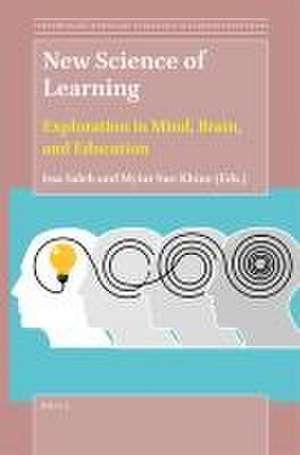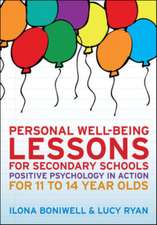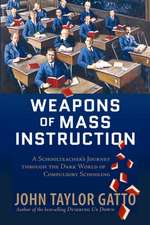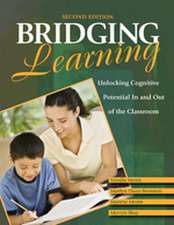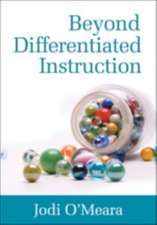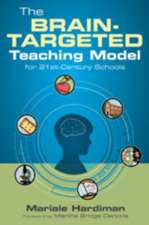New Science of Learning: Exploration in Mind, Brain, and Education: Contemporary Approaches to Research in Learning Innovations, cartea 14
Issa M. Saleh, Myint Swe Khineen Limba Engleză Paperback – 25 ian 2023
| Toate formatele și edițiile | Preț | Express |
|---|---|---|
| Paperback (1) | 961.55 lei 43-57 zile | |
| Springer – 18 sep 2014 | 961.55 lei 43-57 zile | |
| Hardback (1) | 967.22 lei 43-57 zile | |
| Springer – 13 mai 2010 | 967.22 lei 43-57 zile |
Preț: 295.98 lei
Nou
Puncte Express: 444
Preț estimativ în valută:
56.64€ • 59.28$ • 47.14£
56.64€ • 59.28$ • 47.14£
Carte indisponibilă temporar
Doresc să fiu notificat când acest titlu va fi disponibil:
Se trimite...
Preluare comenzi: 021 569.72.76
Specificații
ISBN-13: 9789004540743
ISBN-10: 9004540741
Pagini: 245
Dimensiuni: 155 x 235 mm
Greutate: 0 kg
Editura: Brill
Colecția Brill
Seria Contemporary Approaches to Research in Learning Innovations
ISBN-10: 9004540741
Pagini: 245
Dimensiuni: 155 x 235 mm
Greutate: 0 kg
Editura: Brill
Colecția Brill
Seria Contemporary Approaches to Research in Learning Innovations
Notă biografică
Issa Saleh, PhD, University of North Florida, USA, is Associate Professor at University of Bahrain, Kingdom of Bahrain. He has published edited volumes in education, including New Science of Learning: Cognition, Computers and Collaboration in Education (Springer, 2010).
Myint Swe Khine, EdD, Curtin University, Australia, currently teaches at the same university. He has published numerous research papers and edited several volumes on education. Recent publications include Handbook of Research on Teacher Education: Innovations and Practices in Asia (Springer, 2022), and Methodology for Multilevel Modeling in Educational Research: Concepts and Applications (Springer, 2022).
Myint Swe Khine, EdD, Curtin University, Australia, currently teaches at the same university. He has published numerous research papers and edited several volumes on education. Recent publications include Handbook of Research on Teacher Education: Innovations and Practices in Asia (Springer, 2022), and Methodology for Multilevel Modeling in Educational Research: Concepts and Applications (Springer, 2022).
Cuprins
List of Figures and Tables
Notes on Contributors
1 Mind, Brain, and Education: Shaping the Future of Learning
Myint Swe Khine and Issa Saleh
2 The Synthesising Mind
Howard Gardner
3 What Brain Imaging Research and Science of Reading Can Do for Arabic Language Teaching & Learning
Hanada Taha-Thomure
4 Independent Learning and the Essential Role of Feedback
Heather Kanuka
5 Re-discovering the Affective Foundations of Cognition: Implications for Theory and Practice in Education
Kedmon Nyasha Hungwe
6 The Science of Learning Should Include the Study of Habits
Laura Flores Shaw
7 Learning from a Cognitive Neuroscience Perspective
Said Lotfi, Ilham Zerdani and Leila Elouafi
8 Neuroscience of Wisdom: Implications for Education
Kiana Habibagahi, Harley Glassman, Milan Lazic and Michel Ferrari
9 The Neuroscience of Wisdom: A Logic Model
Kiana Habibagahi, Harley Glassman, Milan Lazic and Michel Ferrari
10 A New Science of Teaching
Tracey Tokuhama-Espinosa
11 Science Is Friendship: New Interdisciplinary Education of Disabled Persons
Antonio M. Battro
12 Understanding How the Brain Relates Scientific Concepts and Identifies Misconceptions Using Concept Maps
Ziad Shaker ElJishi
Index
Notes on Contributors
1 Mind, Brain, and Education: Shaping the Future of Learning
Myint Swe Khine and Issa Saleh
2 The Synthesising Mind
Howard Gardner
3 What Brain Imaging Research and Science of Reading Can Do for Arabic Language Teaching & Learning
Hanada Taha-Thomure
4 Independent Learning and the Essential Role of Feedback
Heather Kanuka
5 Re-discovering the Affective Foundations of Cognition: Implications for Theory and Practice in Education
Kedmon Nyasha Hungwe
6 The Science of Learning Should Include the Study of Habits
Laura Flores Shaw
7 Learning from a Cognitive Neuroscience Perspective
Said Lotfi, Ilham Zerdani and Leila Elouafi
8 Neuroscience of Wisdom: Implications for Education
Kiana Habibagahi, Harley Glassman, Milan Lazic and Michel Ferrari
9 The Neuroscience of Wisdom: A Logic Model
Kiana Habibagahi, Harley Glassman, Milan Lazic and Michel Ferrari
10 A New Science of Teaching
Tracey Tokuhama-Espinosa
11 Science Is Friendship: New Interdisciplinary Education of Disabled Persons
Antonio M. Battro
12 Understanding How the Brain Relates Scientific Concepts and Identifies Misconceptions Using Concept Maps
Ziad Shaker ElJishi
Index
Recenzii
Endorsements:
"The book brings together leading researchers who study how technology can enhance student learning. They address questions of how technology can support collaborative learning, knowledge building, assessment, metacognition, and professional development. For example, a chapter by Howard Gardner and his colleagues describes how students are changing as they grow up with new technologies, and a chapter by Kurt W. Fischer and his colleagues describes redesigning testing with the use of latest in computer technology and learning science. Altogether it is a fine collection of chapters about the latest advances in educational technology." (Allan Collins, Northwestern University – Author, Rethinking Education in the Age of Technology)
"Modern learning technologies have emerged in the 21st century as powerful tools to enhance learning and thinking, but much of their potential remains to be realized. Remarkably, as we explore how learners interact with diverse learning environments, including digital media, we are discovering that these tools also are revealing new insights into how our minds operate and how better to realize the promise that learning technologies offer. This book presents some of the latest discoveries and theoretical insights about how we think and learn, especially through explorations employing digital media. This is a first-class book containing chapters by some of the best researchers worldwide." (O. R. Anderson, Columbia University, Teachers College – Chair, Mathematics, Science and Technology)
"Modern learning technologies have emerged in the 21st century as powerful tools to enhance learning and thinking, but much of their potential remains to be realized. Remarkably, as we explore how learners interact with diverse learning environments, including digital media, we are discovering that these tools also are revealing new insights into how our minds operate and how better to realize the promise that learning technologies offer. This book presents some of the latest discoveries and theoretical insights about how we think and learn, especially through explorations employing digital media. This is a first-class book containing chapters by some of the best researchers worldwide." (O. R. Anderson, Columbia University, Teachers College – Chair, Mathematics, Science and Technology)
Textul de pe ultima copertă
The earliest educational software simply transferred print material from the page to the monitor. Since then, the Internet and other digital media have brought students an ever-expanding, low-cost knowledge base and the opportunity to interact with minds around the globe—while running the risk of shortening their attention spans, isolating them from interpersonal contact, and subjecting them to information overload.
The New Science of Learning: Cognition, Computers and Collaboration in Education deftly explores the multiple relationships found among these critical elements in students’ increasingly complex and multi-paced educational experience. Starting with instructors’ insights into the cognitive effects of digital media—a diverse range of viewpoints with little consensus—this cutting-edge resource acknowledges the double-edged potential inherent in computer-based education and its role in shaping students’ thinking capabilities. Accordingly, the emphasis is on strategies that maximize the strengths and compensate for the negative aspects of digital learning, including:
Endorsements:
"The book brings together leading researchers who study how technology can enhance student learning. They address questions of how technology can support collaborative learning, knowledge building, assessment, metacognition, and professional development. For example, a chapter by Howard Gardner and his colleagues describes how students are changing as they grow up with new technologies, and a chapter by Kurt W. Fischer and his colleagues describes redesigning testing with the use of latest in computer technology and learning science. Altogether it is a fine collection of chapters about the latest advances in educational technology."
Allan Collins, Northwestern University – Author, Rethinking Education in the Age of Technology
"Modern learning technologies have emerged in the 21st century as powerful tools to enhance learning and thinking, but much of their potential remains to be realized. Remarkably, as we explore how learners interact with diverse learning environments, including digital media, we are discovering that these tools also are revealing new insights into how our minds operate and how better to realize the promise that learning technologies offer. This book presents some of the latest discoveries and theoretical insights about how we think and learn, especially through explorations employing digital media. This is a first-class book containing chapters by some of the best researchers worldwide."
O. R. Anderson, Columbia University, Teachers College – Chair, Mathematics, Science and Technology
The New Science of Learning: Cognition, Computers and Collaboration in Education deftly explores the multiple relationships found among these critical elements in students’ increasingly complex and multi-paced educational experience. Starting with instructors’ insights into the cognitive effects of digital media—a diverse range of viewpoints with little consensus—this cutting-edge resource acknowledges the double-edged potential inherent in computer-based education and its role in shaping students’ thinking capabilities. Accordingly, the emphasis is on strategies that maximize the strengths and compensate for the negative aspects of digital learning, including:
- Group cognition as a foundation for learning
- Metacognitive control of learning and remembering
- Higher education course development using open education resources
- Designing a technology-oriented teacher professional development model
- Supporting student collaboration with digital video tools
- Teaching and learning through social annotation practices
Endorsements:
"The book brings together leading researchers who study how technology can enhance student learning. They address questions of how technology can support collaborative learning, knowledge building, assessment, metacognition, and professional development. For example, a chapter by Howard Gardner and his colleagues describes how students are changing as they grow up with new technologies, and a chapter by Kurt W. Fischer and his colleagues describes redesigning testing with the use of latest in computer technology and learning science. Altogether it is a fine collection of chapters about the latest advances in educational technology."
Allan Collins, Northwestern University – Author, Rethinking Education in the Age of Technology
"Modern learning technologies have emerged in the 21st century as powerful tools to enhance learning and thinking, but much of their potential remains to be realized. Remarkably, as we explore how learners interact with diverse learning environments, including digital media, we are discovering that these tools also are revealing new insights into how our minds operate and how better to realize the promise that learning technologies offer. This book presents some of the latest discoveries and theoretical insights about how we think and learn, especially through explorations employing digital media. This is a first-class book containing chapters by some of the best researchers worldwide."
O. R. Anderson, Columbia University, Teachers College – Chair, Mathematics, Science and Technology
Caracteristici
Reflects computational developments and their impacts on education
Offers a qualitatively different approach to meet the demands of twenty-first century skills
Critically examines the scientific understanding of future learning
Includes supplementary material: sn.pub/extras
Offers a qualitatively different approach to meet the demands of twenty-first century skills
Critically examines the scientific understanding of future learning
Includes supplementary material: sn.pub/extras
